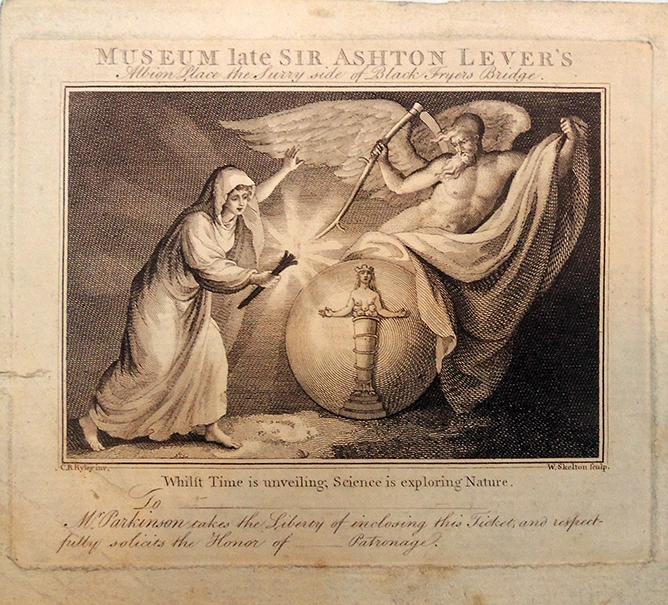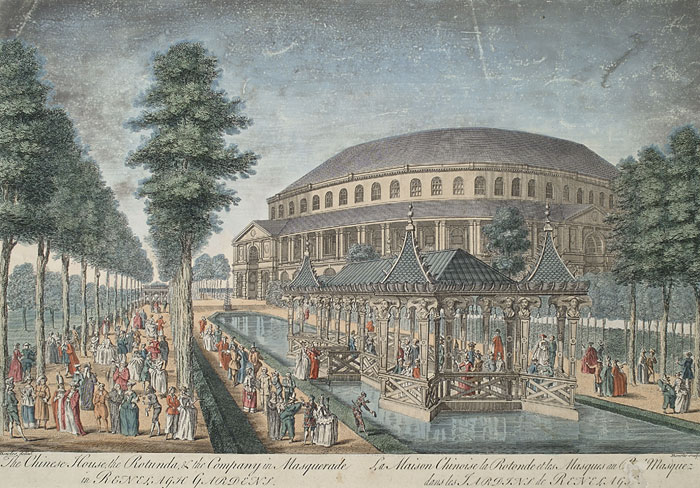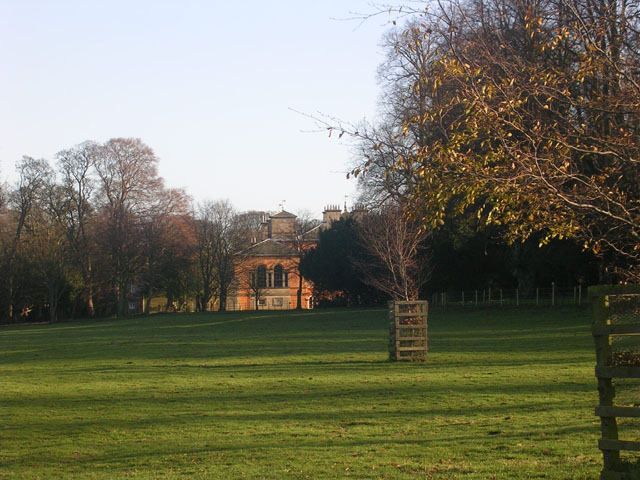|
James Parkinson (museum Proprietor)
James Parkinson (baptised 28 February 1730, St Mary's Church, Shrewsbury – 25 February 1813) was an English land agent and the proprietor of the Leverian Museum which he won in a lottery. He then moved the Leverian collection to a museum at the Blackfriars Rotunda which was sometimes referred to as "Parkinson's Museum". He has sometimes been confused with the surgeon James Parkinson. Life Parkinson was the son of James Parkinson and his wife, Jane Birch who had moved from Ireland to Shrewsbury in 1723. His first training was as a law stationer, but he then became a land agent and accountant. In 1769 he helped in the settlement of Sir Thomas Robinson's tangled estates at Rokeby, Yorkshire. This success made his reputation. He later became involved in the Ranelagh Gardens. Parkinson's wife Sarah (married around 1775) had bought two tickets at a guinea each of the lottery for the disposal of the Holophusicon collection of Sir Ashton Lever sometime in 1784. On 23 March 1786, the d ... [...More Info...] [...Related Items...] OR: [Wikipedia] [Google] [Baidu] |
St Mary's Church, Shrewsbury
St Mary's Church is a redundant Anglican church in St Mary's Place, Shrewsbury, Shropshire, England. It is recorded in the National Heritage List for England as a designated Grade I listed building, and is under the care of the Churches Conservation Trust, the Trust designated St Mary's as its first Conservation Church in 2015. It is the largest church in Shrewsbury. Clifton-Taylor includes the church in his list of 'best' English parish churches. Collegiate Church St Mary's originated as a collegiate church (The Collegiate Church and Royal Free Chapel of St Mary the Virgin, a Royal Peculiar). According to tradition it was founded by King Edgar in the 10th century. By at least the 13th century, it was served by a dean and nine canons. Excavations in 1864 revealed the presence of an earlier church with a nave and an apsidal chancel. Building of the present church began in the 12th century, consisting of a nave without aisles, and a cruciform east end. A la ... [...More Info...] [...Related Items...] OR: [Wikipedia] [Google] [Baidu] |
Ranelagh Gardens
Ranelagh Gardens (; alternative spellings include Ranelegh and Ranleigh, the latter reflecting the English pronunciation) were public pleasure gardens located in Chelsea, then just outside London, England, in the 18th century. History The Ranelagh Gardens were so called because they occupied the site of Ranelagh House, built in 1688–89 by The 1st Earl of Ranelagh, an Anglo-Irish peer who was the Treasurer of Chelsea Hospital (1685–1702), immediately adjoining the hospital; according to Bowack's ''Antiquities of Middlesex'' (1705), it was "Designed and built by himself". Its actual builder and owner was one Solomon Rieti, an Italian Jewish immigrant. Rieti's niece, Rebecca Rieti, was the grandmother of Benjamin Disraeli. Ranelagh House was demolished in 1805 (Colvin 1995, p. 561). The original Ranelagh ( ga, Raghnallach) was one of the Earl's Irish estates: a similar pleasure garden was opened near Dublin city, and this gives its name to the present-day suburb of R ... [...More Info...] [...Related Items...] OR: [Wikipedia] [Google] [Baidu] |
Businesspeople From Shrewsbury
A businessperson, businessman, or businesswoman is an individual who has founded, owns, or holds shares in (including as an angel investor) a private-sector company. A businessperson undertakes activities (commercial or industrial) for the purpose of generating cash flow, sales, and revenue by using a combination of human, financial, intellectual, and physical capital with a view to fueling economic development and growth. History Prehistoric period: Traders Since a "businessman" can mean anyone in industry or commerce, businesspeople have existed as long as industry and commerce have existed. "Commerce" can simply mean "trade", and trade has existed through all of recorded history. The first businesspeople in human history were traders or merchants. Medieval period: Rise of the merchant class Merchants emerged as a "class" in medieval Italy (compare, for example, the Vaishya, the traditional merchant caste in Indian society). Between 1300 and 1500, modern accoun ... [...More Info...] [...Related Items...] OR: [Wikipedia] [Google] [Baidu] |
1813 Deaths
Events January–March * January 18–January 23 – War of 1812: The Battle of Frenchtown is fought in modern-day Monroe, Michigan between the United States and a British and Native American alliance. * January 24 – The Philharmonic Society (later the Royal Philharmonic Society) is founded in London. * January 28 – Jane Austen's '' Pride and Prejudice'' is published anonymously in London. * January 31 – The Assembly of the Year XIII is inaugurated in Buenos Aires. * February – War of 1812 in North America: General William Henry Harrison sends out an expedition to burn the British vessels at Fort Malden by going across Lake Erie via the Bass Islands in sleighs, but the ice is not hard enough, and the expedition returns. * February 3 – Argentine War of Independence: José de San Martín and his Regiment of Mounted Grenadiers gain a largely symbolic victory against a Spanish royalist army in the Battle of San Lorenzo. * February ... [...More Info...] [...Related Items...] OR: [Wikipedia] [Google] [Baidu] |
1730 Births
Year 173 ( CLXXIII) was a common year starting on Thursday (link will display the full calendar) of the Julian calendar. At the time, it was known as the Year of the Consulship of Severus and Pompeianus (or, less frequently, year 926 ''Ab urbe condita''). The denomination 173 for this year has been used since the early medieval period, when the Anno Domini calendar era became the prevalent method in Europe for naming years. Events By place Roman Empire * Gnaeus Claudius Severus and Tiberius Claudius Pompeianus become Roman Consuls. * Given control of the Eastern Empire, Avidius Cassius, the governor of Syria, crushes an insurrection of shepherds known as the Boukoloi. Births * Maximinus Thrax ("the Thracian"), Roman emperor (d. 238) * Mi Heng, Chinese writer and musician (d. 198) Deaths * Donatus of Muenstereifel, Roman soldier and martyr (b. AD 140 Year 140 ( CXL) was a leap year starting on Thursday (link will display the full calendar) of the Julian cal ... [...More Info...] [...Related Items...] OR: [Wikipedia] [Google] [Baidu] |
Joseph T
Joseph is a common male given name, derived from the Hebrew Yosef (יוֹסֵף). "Joseph" is used, along with "Josef", mostly in English, French and partially German languages. This spelling is also found as a variant in the languages of the modern-day Nordic countries. In Portuguese and Spanish, the name is "José". In Arabic, including in the Quran, the name is spelled '' Yūsuf''. In Persian, the name is "Yousef". The name has enjoyed significant popularity in its many forms in numerous countries, and ''Joseph'' was one of the two names, along with ''Robert'', to have remained in the top 10 boys' names list in the US from 1925 to 1972. It is especially common in contemporary Israel, as either "Yossi" or "Yossef", and in Italy, where the name "Giuseppe" was the most common male name in the 20th century. In the first century CE, Joseph was the second most popular male name for Palestine Jews. In the Book of Genesis Joseph is Jacob's eleventh son and Rachel's first son, and k ... [...More Info...] [...Related Items...] OR: [Wikipedia] [Google] [Baidu] |
Ashton Lever
Sir Ashton Lever Fellow of the Royal Society, FRS (5 March 1729 – 28 January 1788) was an England, English collector of natural objects, in particular the Leverian collection.Ashton Lever Manchester celebrities], retrieved 31 August 2010 Biography Lever was born in 1729 at Alkrington, Alkrington Hall. In 1735 Sir James Darcy Lever, his father, served as High Sheriff of Lancashire. Lever began by collecting seashells in about 1760, and gradually accumulated one of the richest private collections of natural objects, including live animals. He opened it to the public in April 1766, in Manchester, moving the museum to his family home at Alkrington Hall, near Rochdale, Lancashire, in 1771. In the same year he founded Archers' Hall, Inner Circle, Regent's Park, London for the Archers ...[...More Info...] [...Related Items...] OR: [Wikipedia] [Google] [Baidu] |
Holophusicon
The Leverian collection was a natural history and ethnographic collection assembled by Ashton Lever. It was noted for the content it acquired from the voyages of Captain James Cook. For three decades it was displayed in London, being broken up by auction in 1806. The first public location of the collection was the Holophusikon, also known as the Leverian Museum, at Leicester House, on Leicester Square, from 1775 to 1786. After it passed from Lever's ownership, it was displayed for nearly twenty years more at the purpose-built Blackfriars Rotunda just across the Thames, sometimes called Parkinson's Museum for its subsequent owner, James Parkinson (c. 1730-1813). At Alkrington Lever collected fossils, shells, and animals (birds, insects, reptiles, fish, monkeys) for many years, accumulating a large collection at his home at Alkrington, near Manchester. He was swamped with visitors, whom he allowed to view his collection for free, so much so that he had to insist that visitors t ... [...More Info...] [...Related Items...] OR: [Wikipedia] [Google] [Baidu] |
Rokeby Park
Rokeby Park is a country house in the Palladian style in the civil parish of Rokeby, in Northern England. It is close to the confluence of the River Tees and River Greta, near Greta Bridge in what is now County Durham. It was historically in the North Riding of Yorkshire. Rokeby is pronounced ‘rookbee’ (although many pronounce it ‘rowk-bee’ and this is the more commonly heard pronunciation locally). It is the private home of Sir Andrew Morritt but is open to the public on selected days. The house is the original English home of the painting ''The Toilet of Venus'' by Diego Velázquez, now known in English as ''The Rokeby Venus''. The original now hangs in the National Gallery, London and a copy in the saloon at Rokeby Park. Sir Walter Scott was a regular visitor to the house and used it as the setting for his narrative poem '' Rokeby'' in 1812. The building is of interest in its own right. Completed in 1735 (and known at the time as Rokeby Hall) by Sir Thomas Robinson ... [...More Info...] [...Related Items...] OR: [Wikipedia] [Google] [Baidu] |
England
England is a country that is part of the United Kingdom. It shares land borders with Wales to its west and Scotland to its north. The Irish Sea lies northwest and the Celtic Sea to the southwest. It is separated from continental Europe by the North Sea to the east and the English Channel to the south. The country covers five-eighths of the island of Great Britain, which lies in the North Atlantic, and includes over 100 smaller islands, such as the Isles of Scilly and the Isle of Wight. The area now called England was first inhabited by modern humans during the Upper Paleolithic period, but takes its name from the Angles, a Germanic tribe deriving its name from the Anglia peninsula, who settled during the 5th and 6th centuries. England became a unified state in the 10th century and has had a significant cultural and legal impact on the wider world since the Age of Discovery, which began during the 15th century. The English language, the Anglican Church, and Engli ... [...More Info...] [...Related Items...] OR: [Wikipedia] [Google] [Baidu] |
Thomas Robinson, 1st Baronet Rokeby
Sir Thomas Robinson, 1st Baronet (1703–1777), of Rokeby, Yorkshire, was an English politician who sat in the House of Commons from 1727 to 1734 and a Governor of Barbados. He was an architect, collector and an extravagant character, whose life was the inspiration for numerous anecdotes. Early life Robinson was eldest son and heir of William Robinson (bapt. Rokeby, Yorkshire, 23 September 1675, d. 24 February 1720), who married, in 1699, Anne, daughter and heiress of Robert Walters of Cundall in Yorkshire; she died on 26 July 1730, aged 53, and was buried in the centre of the south aisle of Merton church, Surrey, where a marble monument was placed to her memory. Sir Thomas, her son, also erected on the old Roman highway, near Rokeby, an obelisk in her honour. Another son was Richard, 1st Baron Rokeby, Church of Ireland Primate of All Ireland and Archbishop of Armagh. After finishing his education, Robinson went on the Grand Tour, paying attention to architecture in Greece and ... [...More Info...] [...Related Items...] OR: [Wikipedia] [Google] [Baidu] |
Agent (law)
The law of agency is an area of commercial law dealing with a set of contractual, quasi-contractual and non-contractual fiduciary relationships that involve a person, called the agent, that is authorized to act on behalf of another (called the principal) to create legal relations with a third party. Succinctly, it may be referred to as the equal relationship between a principal and an agent whereby the principal, expressly or implicitly, authorizes the agent to work under their control and on their behalf. The agent is, thus, required to negotiate on behalf of the principal or bring them and third parties into contractual relationship. This branch of law separates and regulates the relationships between: * agents and principals (internal relationship), known as the principal-agent relationship; * agents and the third parties with whom they deal on their principals' behalf (external relationship); and * principals and the third parties when the agents deal. Concepts The recipro ... [...More Info...] [...Related Items...] OR: [Wikipedia] [Google] [Baidu] |




_Page72_Image1.jpg)


.jpg)